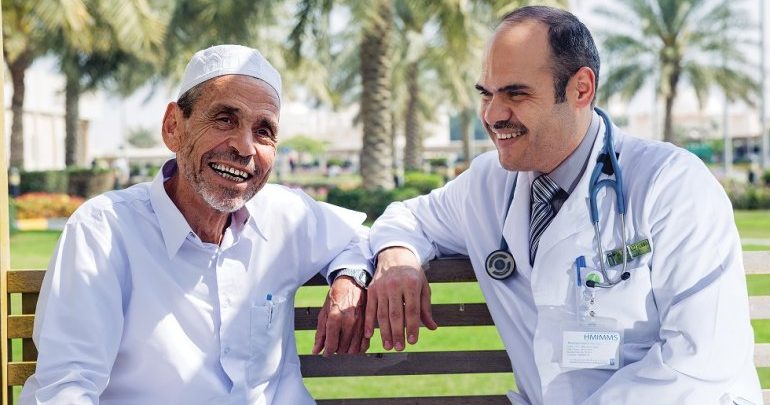
HMC advises fasting older adults to monitor health during Ramadan
حمد الطبية تنصح كبار السن بالتغذية السليمة خلال فترات الصيام
Doha: People over 65 years old who are fasting this Holy month of Ramadan should speak with their doctor if they notice any warning signs of illness, said Dalia Elissawi, a Clinical Dietitian at Hamad Medical Corporation’s (HMC) Home Health Care Service.
“Most elderly individuals who have no major health problems can fast without any adverse health impacts, but she says fasting should be avoided, or at the very least carefully supervised, in those who have chronic or geriatric illnesses,” she said.
“Elderly individuals with health problems are generally not able to fast. Frail and weak elderly patients who fast can place themselves at increased risk for complications; therefore, it is important they speak with their doctor if they experience any signs of illness.
We generally advise elderly patients to see their doctor before the Holy month of Ramadan, but if they have begun fasting it is important that they seek medical advice if they experience any signs of poor health. In some cases their doctor may recommend an alternative treatment plan that will allow them to continue the fast,” Elissawi. added.
Elderly patients who have multiple chronic illnesses that are being treated with medications are especially vulnerable to complications and must consult their doctor if they are fasting and experiencing signs of poor health. Elissawi said the Suhoor meal is particularly important for elderly patients who fast and she recommends eating smaller portions of high-calorie, slow-digesting foods.
“Aging influences people’s eating habits and dietary choices. Tooth loss, health conditions, and general weakness may result in chewing problems and lead to reduced food intake and an unbalanced diet. When hosting elderly individuals for Ramadan meals, the goal should be serving dishes that contain the right amount of nutritious and healthy calories without overloading their plate.
We recommend breaking the fast with milk and dates, followed by soup and foods high in fiber, such as oatmeal, vegetables, fruits, and beans. Lean meat, skinless poultry, and fish are also great options.”
Smaller portions of higher calorie nutrient-dense foods will help ensure the individual is able to maintain their strength while preventing bloating, indigestion, and an upset stomach. She recommends limiting fast-digesting carbohydrates and foods that are high in sugar and fat, such as cakes.
Elissawi also stressed the importance of being aware of the signs of dehydration.
“Elderly individuals are at an increased risk for dehydration. It is important they drink sufficient amounts of liquids, ideally water, and limit stimulants such as coffee, tea, and soft drinks. Fruits and vegetables, broth-based soups, and smoothies can also be an excellent source of hydration. It is wise to avoid pickled foods, and foods high in salt, which can lead to dehydration,” said Elissawi.
Elissawi also recommends performing light exercises during the day, saying even simple movements that flex the joints and stretch the body can be helpful. She says getting sufficient amounts of rest and sleep is also very important, and she notes the significance of making meals a social experience for elderly individuals.
Elissawi said there are a number of benefits to fasting, provided the individual is in good health. She says fasting can improve conditions like hypertension.
HMC is asking patients who are unable to attend their appointment as a result of their Ramadan-related commitments, to please call Nesma’ak at 16060 so the appointment can be rebooked. This will also allow the appointment slot to be assigned to another patient.
أكدت داليا العيسوي- اختصاصية التغذية العلاجية بخدمات الرعاية المنزلية بمؤسسة حمد الطبية- على ضرورة التغذية السليمة لكبار السن خلال شهر رمضان المبارك لعدم تعرضهم لأي مضاعفات جراء الصيام، حيث يشترط صيام كبار السن عدم الإصابة بالأمراض المزمنة أو أمراض الشيخوخة، حتى لا يكون الصيام عبئاً ثقيلاً عليهم وتجنباً لتعرض حياتهم للخطر.
وشددت العيسوي على ضرورة زيارة الطبيب المتابع للحالة من أجل تقييم الوضع الحالي للأمراض ومدى التحكم فيها وتحديد ما إذا كانت الحالة الصحية العامة تسمح بصيام المسن أم لا، ووضع الخطة العلاجية البديلة التي تتناسب مع مواعيد الصيام والإفطار خلال شهر رمضان، كما أكدت على ضرورة زيارة الطبيب في حال ظهرت أي أعراض مرضية أثناء الصيام على كبار السن.
ومن أجل صيام آمن لكبار السن خلال شهر رمضان يجب تقديم الغذاء الصحي لهم خلال وجبتي الإفطار والسحور، مع اتباع بعض النصائح المتمثلة في التعجيل في تناول وجبة الافطار، والبدء بالتمر واللبن لتهيئة الجهاز الهضمي لاستقبال الطعام، فإن تناول كمية معتدلة من الطعام هو المفتاح الرئيسي للصحة الجيدة، بدء الإفطار بطبق من الشوربة يليّن المعدة ويدفئها بعد نهار طويل من الصوم، ويعوّض السوائل التي خسرها الجسم ويحضّر الجهاز الهضمي لاستيعاب كامل الوجبة، الحرص على تقديم وجبات غذائية متكاملة تحتوي على جميع العناصر الغذائية من مواد نشوية وبروتينية ودهون وفيتامينات، تقسيم الوجبات خلال فترة الافطار على عدة وجبات صغيرة الحجم عالية السعرات، الاعتماد على مصادر البروتين منخفضة الدهون مثل الأسماك، ملاءمة ليونة الطعام حسب قدرة المسن على المضغ والهضم والبلع، التركيز على تناول الأغذية الغنية بالألياف كالخضار والفواكه والحبوب الكاملة، الابتعاد عن تناول الأطعمة الدسمة والمقلية، بالإضافة إلى تجنب الموالح والسكريات البسيطة، وتناول قدر كاف من الماء والسوائل، كما يُنصح أيضاً بالمحافظة على تناول وجبات عائلية جماعية، إذ ان للعوامل الاجتماعية تأثيرا مباشرا على مستوى التغذية لدى المسنين.
وأضافت العيسوي قائلةً: “يعد السحور من أهم الوجبات التي تحافظ على مستويات الطاقة الخاصة بالجسم خلال معظم فترات النهار أثناء الصيام، لذلك يجب أن تكون معتدلة وتوفر للجسم ما يحتاجه من طاقة لعدة ساعات وخاصةً لكبار السن، ويفضل تأخير وجبة السحور إلى ما قبل الفجر، ويُنصح بعدم العودة إلى النوم مباشرة بعد تناول السحور، يفضل أن تحتوي وجبة السحور على الألياف والكربوهيدرات المعقّدة مثل الحبوب والبقوليات، بحيث تعطي الجسم وقتاً أطول في امتصاص هذه المغذيات والمحافظة على مستوى السكر في الدم، لابد أن يحتوي السحور على الأغذية الغنية بالبروتين، مثل الحليب، الألبان والأجبان قليلة الدسم، والبيض، شرب كمية كافية من الماء والسوائل، بالإضافة إلى تجنب المخللات وتقليل كميات الملح المضاف للطعام، والابتعاد عن المشروبات الغنية بالكافيين.
وأوضحت قائلةً: “يجب عدم تناول الوجبات الدسمة أو المقالي في السحور، لأنها قد تسبب عسر الهضم والحرقة والانتفاخ، وينصح بتناول الفواكه في السحور للتغلب على العطش خلال النهار، وأيضاً لتجنب مشاكل الإمساك.
وأشارت العيسوي إلى ضرورة التوقف عن الصيام عند ظهور أي عرض صحي طارىء مثل الإعياء والدوخة أو الجفاف، هبوط الضغط والسكر بشكل حاد أو ملحوظ، والتوجه للطبيب مباشرةً.



